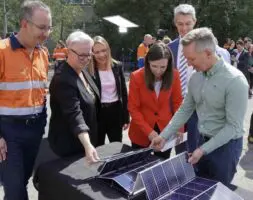The federal Labor government has announced the formation of a new review that designed to help reform community engagement around renewable energy infrastructure upgrades and new development as it seeks to clear the path to its targeted 82 per cent renewables by 2030.
The newly created Community Engagement Review will be led by Andrew Dyer, the Australian Energy Infrastructure Commissioner (AEIC), and will report later this year to Australia’s minister for climate change and energy, Chris Bowen.
The Review will seek to provide advice on the best way to maximise community engagement through planning, developing, and operating new energy infrastructure as project developers face increasing obstacles for both wind and solar projects, and new transmission lines.
Many proposed transmission lines – seen as essential by the Australian Energy Market Operator in its 30-year planning blueprint for the transition to renewables – have faced local opposition, forcing routes to be changed and construction to be delayed.
State governments have sought to alleviate concerns by doubling the amount of money paid to landowner hosts of the infrastructure, but opposition remains, and in the New England region of NSW led by anti-renewable Nationals MP Barnaby Joyce, who is seeking to rally opponents on the steps of Parliament House.
In Victoria, the state government is in the throes of taking back transmission planning after a series of setbacks on some of its planned transmission routes.
Bowen says the review will seek to develop community engagement strategies for communities, landowners, and First Nations people.
“The government is working with states, territories, communities, market bodies, and energy companies to ensure community consultation on new energy infrastructure isn’t just a tick-a-box exercise,” Bowen said in a statement.
“Our reforms are focused on giving better information to landholders and communities about their rights, involving communities earlier and more effectively, and properly handling any complaints.”
The review was welcomed by independent Senator David Pocock, who helped negotiate the deal along with the Independent MP for Indi, Helen Haines.
“The speed and success of our transition to clean energy depends in large part on ensuring that communities in which this infrastructure is rolled out enjoy the benefits that come from the clean energy industry,” Pocock said in a statement.
“While necessary, new renewable energy infrastructure such as transmission lines can have a significant impact on landholders and the environment.
“It’s critical that as this new infrastructure is delivered we are actively consulting with and considering the needs of all impacted stakeholders, including traditional owners and farmers.
“Further to our negotiations, the Minister has confirmed that this review will be properly resourced and genuinely consultative, holding roundtables in regional communities, including in Renewable Energy Zones.
Further information about the review including the terms of reference is available here.










